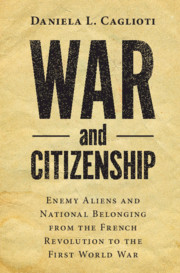3 results
Introduction
-
- Book:
- War and Citizenship
- Published online:
- 30 October 2020
- Print publication:
- 19 November 2020, pp 1-14
-
- Chapter
- Export citation
1 - The Emergence of the Enemy Alien
- from Part I - Background
-
- Book:
- War and Citizenship
- Published online:
- 30 October 2020
- Print publication:
- 19 November 2020, pp 17-39
-
- Chapter
- Export citation

War and Citizenship
- Enemy Aliens and National Belonging from the French Revolution to the First World War
-
- Published online:
- 30 October 2020
- Print publication:
- 19 November 2020

